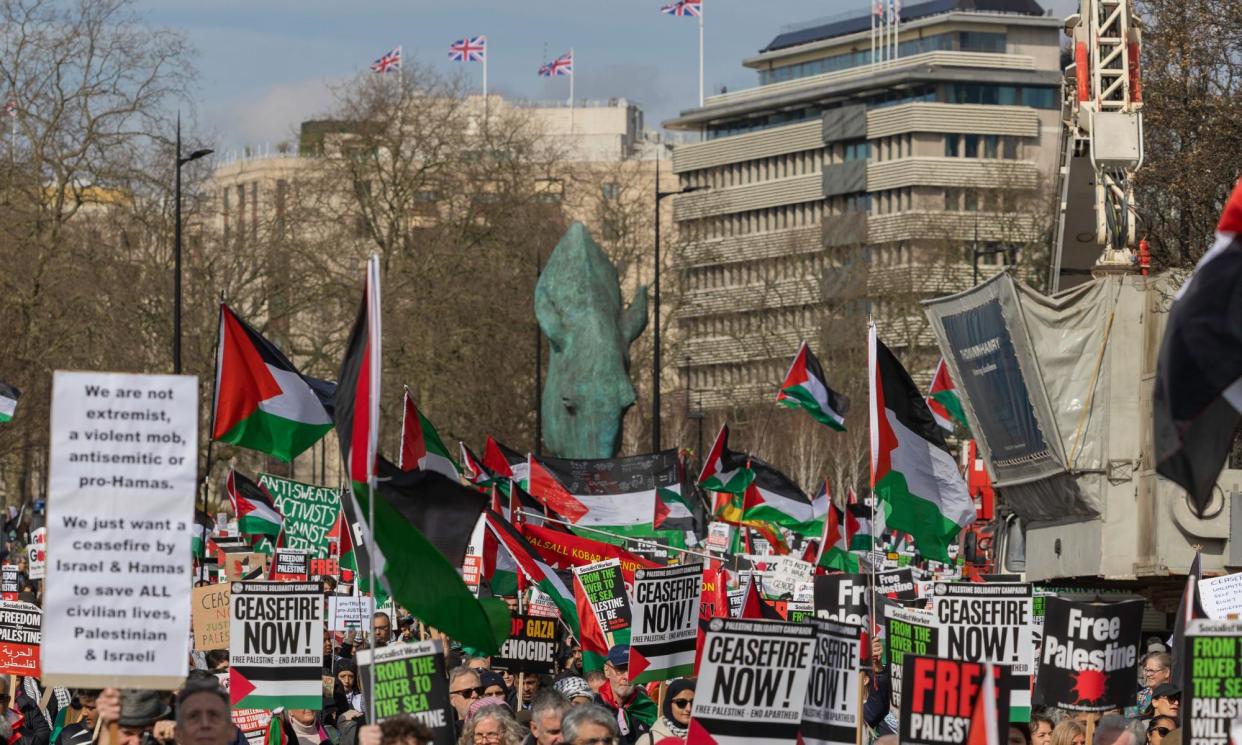Extending extremism definition risks fuelling unlawful protest, warns Greenpeace UK

Attempts by the government to capture more groups in its official definition of extremism risk fuelling the very extremism it claims to be trying to oppose, Greenpeace UK has said.
Ahead of an expected announcement by Michael Gove on Thursday, Areeba Hamid, joint executive director of the group, warned that shrinking the space for peaceful protesters in the UK would encourage others to go down the path of more destructive and unlawful forms of protest.
Hamid told the Guardian: “Cracking down on peaceful protest won’t help combat extremism, but risks fuelling it instead. The right to protest is the safety valve of a healthy democracy – it provides people with a space to express their dissent peacefully. When you make peaceful, legal protest off limits, you exclude peaceful, law-abiding protesters from the conversation, and give their space to people who are less concerned about peacefulness and legality.”
Related: Michael Gove to name organisations affected by new extremism definition
On Thursday, Gove, the levelling up secretary, is expected to announce a new definition of extremism, understood to be an effort to include groups thought to subvert British democracy, with a focus on ideology rather than on words or actions.
Muslim groups who have organised protests against the UK’s military and diplomatic support for Israel’s assault on Gaza are thought to be the intended targets of the latest crackdown, but environmental and other protest groups expect it to be used to target them too.
Also expected soon is a review of “political violence and disruption” by John Woodcock, a former Labour MP turned crossbench peer, who was ennobled by Boris Johnson.
This month Woodcock proposed a ban on MPs and councillors engaging with groups who use disruptive protest tactics – a move said to be under consideration by ministers. Similarly, Gove is expected to tell government bodies not to engage with or fund any group defined as extremist under the new rules.
Will McCallum, who runs Greenpeace alongside Hamid, said such suggestions risked undermining the foundations of democracy in the UK. “All they are trying to do right now is a cynical move to stifle the voices they don’t want to listen to,” he said.
“And that is why we’re worried, because the moment you go down that route, where you get to label anything you don’t like as extremist, then you are following in the footsteps of autocracies around the world.”
Such a crackdown had affected Greenpeace in India under the government of Narendra Modi, India’s prime minister. Hamid, who campaigned in India at the time, added: “I vividly remember what it felt like to be the target of a deliberate government effort to demonise and silence civil society organisations.
“This is not the situation in the UK right now, but stretching the definition of extremism to score political points is a slippery slope and the government should step nowhere near it.”
The latest expected measures come after what civil liberties campaigners have described as an unprecedented crackdown on popular dissent in the UK. Two wide-ranging laws in two years have given police substantial powers to curtail protests and created a host of new protest-related offences.
In spite of those measures, the prime minister last month claimed the UK was descending into “mob rule” and called for police to crack down on protests at MPs’ homes and constituency offices, at town halls and outside parliament, after chaos in the Commons over a vote on a ceasefire in Gaza was blamed on MPs’ fear of protesters.
Greenpeace was criticised for such a protest at Rishi Sunak’s Yorkshire mansion last August, although the prime minister and his family were on holiday in California at the time. McCallum defended protesters’ right to go to MPs’ homes, although he condemned protests that descended into harassment.
“Context matters. Are they a decision maker? What’s the decision they’ve made? How are you doing it?” McCallum said.
Related: ‘An appalling direction’: UK activists criticise plans to redefine extremism
Essentially, said McCallum, the problem of more and bigger protests could not be solved by a crackdown. “They’ve become more disruptive because the situation we’re in has become more dire,” he said.
“People would not be gathering in greater numbers, they would not be undertaking greater disruption, if they weren’t opening the newspaper every day and seeing a planet on fire, people having to flee their homes right the way across the world.
“So before looking at should we be controlling the protests, why are people showing up? People don’t put themselves into inconvenience, they don’t get arrested, they don’t go to prison because they like it. They are going there because something is going wrong in society.”
The Department for Levelling Up, Housing and Communities has been contacted for comment.


